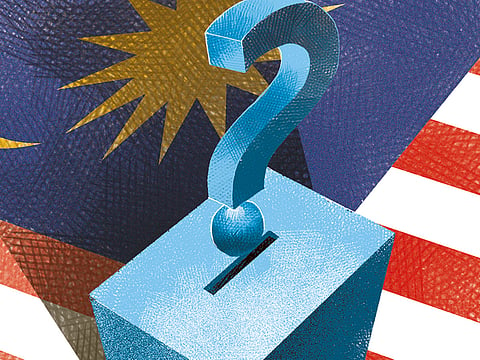Malaysia is on the edge as titans clash
With the country going to polls tomorrow, estrangement between one-time allies may decide the outcome

In the next few days curtains are going to rise for the world to witness the outcome of the 14th general election in Malaysia. This poll is one of the most dynamic since the country’s independence seven decades ago. The outcome is being closely watched, both by Malaysians and others, because the country’s political standing and economic stability are at stake.
The campaign leading up to the polling day tomorrow has shown the deep fissures in Malaysian politics that includes areas such as race relations, governance and economic management. These issues have led to the emergence of two hostile camps — one led by the current Prime Minister, Najeeb Razzaq and the other led by former prime minister Dr Mahathir Mohammad. In the process, erstwhile friends have become political foes and political parties like the Chinese-led Democratic Action Party (DAP) and the newly formed Pakatan Harapan (PH) have come together to wrest power from the ruling Barisan Nasional (BN).
BN, which has ruled the country since independence, is facing unprecedented challenges over a range of issues including the multi-billion-dollar 1 Malaysia Development Fund (1MDB) saga and popular resentment over the imposition of GST and the rising cost of living.
BN is banking on its traditional base from the Malay/Muslim community, which had served it well in the past. However, this community is itself divided into urban and rural Malays, who are responding to different messages. The Malay-Muslims are again divided into Partai Islam se (PAS) and a splinter group which is aligned with PH. These divisions within the Malay community not only impact at the National level but also at the State level. 12 of the 13 states are also holding polls on May 9. The state of Sabah on the island of Borneo, which used to be regarded as a ‘safe deposit’ for BN, is not to be taken for granted.
On the other side of the political divide stands the newly minted — Pakatan Harapan, led by former PM Dr Mahathir Mohammad. Less than a year ago, such a coalition could not have been contemplated. Setting aside past differences, Dr Mahathir made up with the leader of PKR Anwar Ebrahim, whom he had jailed during his tenure in office. Same is the case with Lim Kit Siang, leader of PAP who was also harshly treated by Dr Mahathir. Now it appears that all has been forgiven as the shared goal is to defeat BN. Politics indeed makes strange bed fellows!
The gauntlet has been thrown and now it is for the 15 million electorate to make their preferences known at the ballot box on Wednesday.
What is clear is that, with the array of forces lined up against it, BN is unlikely to repeat its 2013 performance and return to power by holding on to its 120 seats in the 222 member parliament. What is also clear is that Dr Mahathir is still held in the same degree of awe as he was during his term in office. It is noteworthy that three of his former colleagues — Tun Daim zainuddin, Rafidah Aziz and Rais Yatim have openly declared their support for their former boss.
Possible outcome
The third certainty is the effect of social media in the transformation of the political messages. Realising that the opposition, particularly the youth, have a decisive edge in this area, the BN has recently passed a law prohibiting the spreading of ‘Fake News’. It is against this background that a long-standing observer of the Malaysian political scene, Leslie Lopez commented as follows on the possible outcome of general elections 14. (Sunday Times, May 6th, 2018)
1. High probability of a slim victory for BN to hold on to power
2. A ‘neutral’ probability of a ‘hung parliament’ in the event of BN securing 106 seats and PH obtaining 104 seats
3. A low probability of a ‘slim’ victory for PH
Whatever the outcome, the Malaysian political scene has been changed forever. How the aftermath will be managed and Malaysia’s reputation has a stable democracy, with strong social and economic underpinnings safeguarded, will depend on leaders on all sides of the political spectrum putting National interest first and foremost. For Association of Southeast Asian Nations (Asean) member states and the international community, this is of vital importance at a time of uncertainties in other parts of the world.
K. Kesavapany is the Adjunct Professor at Lee Kuan Yew School of Public Policy. He was Singapore’s High Commissioner to Malaysia from 1997 to 2002. He also served as Singapore’s Permanent Representative to the UN.



